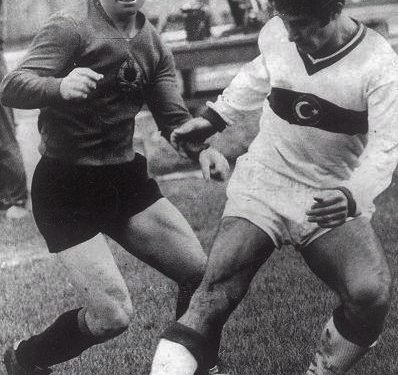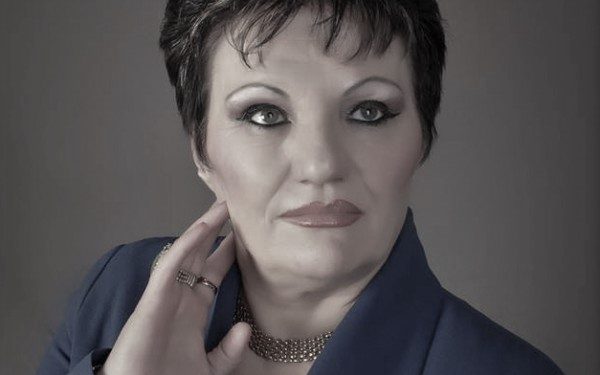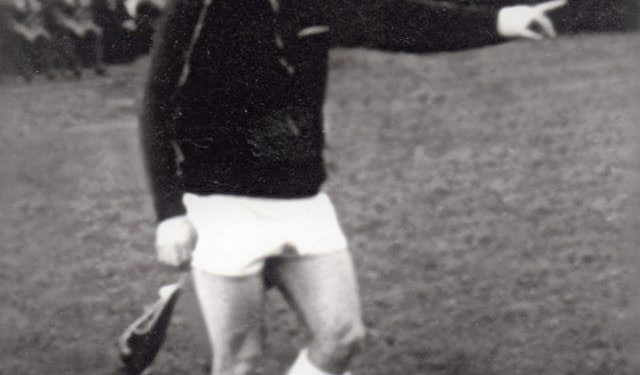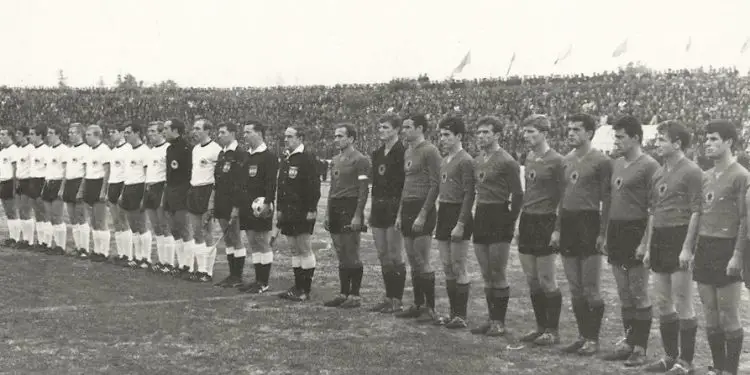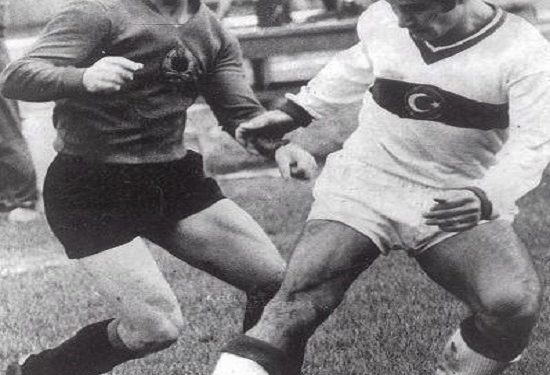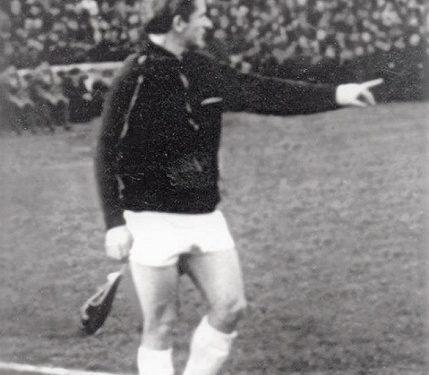Part Four
Memorie.al / And who wouldn’t want today to return to those years of the last century, to recall the impressive and historical memory-panorama, the distinguished elite of Albanian sport, those who made the history of Albanian football, the legendary footballers and heroes of their time, who with intelligence, passion, talent, and professionalism, managed to write history at the national, European, and global levels. Some of them rest in eternal peace, some of them are still here today – noble and proud, idols and legends; they are and will remain major figures, not only for the generation they belonged to and for the future, but also for those dreamers, the young athletes who wish to emulate them; those who created an era! Among them is the legend, the icon of Korça and Albanian football – the unbeatable – Teodor Vaso – a dominant sporting figure in national and international matches, who brought fame and the history of a more professional, spectacular, historical, and mythical football of the last century!
Financial, material, moral, and institutional investment, with the capacity that allows you to genuinely act and behave like a champion, are the motives that lead to the crowning of the objective: the national champion. Many of these factors have been visible and tangible. The first is opportunity, without which the objective cannot be achieved; following that is realization as the second factor, without which it is understandable that you get nowhere, because money, football fields, and material conditions do not move, they do not play; the players play on the pitch.
The footballers under the direction of the coaches – this is where the team’s contribution comes from, which gives all the investments their final name. As valuable and true as what we have stated is, it is also true that in their 1933 championship title, “Skënderbeu” had only one foreigner (who came from Turkey and returned there), Servet Teufik Agaj; all the others were boys from Korça.
Now, by coincidence, the opposite is true; “Skënderbeu” has only one Korça footballer, Bledi Shkëmbi; the other players are non-Korça and foreign. In 1999, on the occasion of the 90th anniversary of the “Vëllazëria e Korçës” Cultural Sports Association, K.F. “Skënderbeu” and “Radio – Korça” organized a poll for the “10 best footballers of the century” in Korça football and the two best goalkeepers, which confirmed this ranking:
Teodor Vaso, Dhimitraq Dembo, Gjergji Ballço, Dhimitraq Xhambazi, Aleko Pilika, Milutin Kërçiç, Veteran Topçiu, Gilbert Rrapo, Gëzim Muhaxhiri, Gentian Lici, and the best goalkeepers: Koço Dinella and Jani Kaçi. The sector-based poll for the footballers of the century determined: “Best Footballer of the Century,” Goalkeepers Koço Dinella and Jani Kaçi, Teodor Vaso (Defender), Milutin Kërçiç (Midfielder), Teli Samsuri (Forward).
In classifying several top-elite footballers in the 11-man format, such as the “best footballer of the century,” I emphasize that no greatness could defeat him on an empty football field. The field of play is full of many other players who were also distinguished and brought glory to Korça. Our greatness was born along with them, which was only somewhat better than that of our other colleagues.
On that field, we conveyed enthusiasm, beauty, education, and culture, footballers such as; T. Veriga, N. Kola, M. Lara, M. Prodani, S. Tole, R. Shëllira, E. Dvorani, G. Strati, A. Deli, Xh. Mborja, M. Kita, V. Bicolli, Gj. Shule, P. Dhëmbi, K. Kotomelo, A. Toshi, Gj. Lika, Gj. Avramushi, I. Tërpo, R. Kallço, H. Shkurti, Gj. Prifti, V. Thimo, P. Qiriazi, I. Papa, P. Bode, C. Stratobërdha, R. Rapo, L. Sërbo, and A. Tytka.
– Mr. Vaso, one ugly phenomenon in Albanian sport today is match-fixing. Did this happen at that time? How do you feel when you read and hear that there is corruption in Albanian sport? And that there is no more spectacular, mature, non-violent football on the sports fields as there used to be?
– The issue of some bad phenomena is complex. It requires joint actions by the players and the team staff. The central football organization (FSHF), the college of referees (and referees individually), police measures for prevention and discipline of problematic situations, violence, and the state, which, within its competencies, should help create enabling conditions for matches to be played normally. Finally, with a massive extraordinary influence, an off-field factor is the behavior of the spectators.
In 1971, during a match between “17 Nëntori” and “Skënderbeu” in Tirana, due to the tendency of bad refereeing (one factor) and the violence of some “17 Nëntori” players (another factor), the “Skënderbeu” players, with the intervention of their coaches (yet another factor), abandoned the field in protest, but only one player remained on the field—the team captain, me (T. Vaso)—who was asking the coaches to bring the team back onto the field because the subsequent punitive measures were very severe, even leading to expulsion from the first category. This action helped prevent a scandal.
The team returned to the field. At that time, for matches to be sold and bought, a lot of money was needed. Back then, no individual could take such sums out of their pocket, because only the state had them, including those for the sports clubs, which were financed by the state. At the same time, the control of such actions was very strict, and if they could be carried out (e.g., theoretically), the punishments were very severe. There were club compromises where the sporting interests were shared for both teams, which were not within the framework of buying, selling, and corruption.
Their realization was extremely coordinated, and never did all the players of one or both teams participate. These “compromises” have also happened globally, even in World Championships. For example, to qualify, East Germany “agreed” to be beaten by the Easterners (1-0) so that they would qualify and West Germany would be ranked second, because this gave them the opportunity to play in the semi-finals, not in the group with the Netherlands, Brazil, and Argentina, the “group of death,” but to play against the Europeans – Poland, Sweden, Yugoslavia.
In this group, they considered qualification easier, which is what happened. The German Democratic Republic qualified in the big group with Brazil. These phenomena never disappear because they are sporting interests that do not have a background of buying, selling, or corruption for financial gain. We live in a time when buying, selling, and corruption have become worrisome phenomena. The Portuguese coach of Chelsea, Jose Mourinho, publicly declared a few weeks ago: “Today’s football is not emotional because players play for money.”
Corruption, the buying and selling of players and matches is a product of the capitalist system that emerges now and then in many countries around the world. They generate acts of corruption involving players, their staff, referees, and club officials, with consequences that come from the disruption of fair play. Two legends of world football, Franz Beckenbauer, Michel Platini, and others have stated to the world opinion that: football will be clean with real results when there are no betting slips for matches.
While the big club “Juventus” and most recently the President of Bayern Munich Football Club, Uli Hoeneß, were involved in serious scandals of manipulation and fiscal evasion, here in Albania, only suspicions of match manipulation have been raised. But here, acts of violence are number one in Europe. In a transition period, where freedom, morality, and citizenship are conceived by a mass that lacked them, and now there are no more rules and laws, it goes to the point of absurdity.
The President of the “Bylis” club severely hits the match delegate for “Bylisi” – “Laçi,” Besnik Çela. In the stands of the Vlora stadium, some time ago, the President of the “Skënderbeu” club, Ardjan Takaj, was hit, and coaches Sulejman Mema and Nevil Dede have been severely hit in the stadiums of Albania.
– How can Albanian society help reduce this ugly phenomenon?
A glass of crystal water is polluted by only 2-3 drops of ink. To poison a buffalo, you only need a small spoon of strong poison. Acts of violence, in a crowd of thousands, are generated by only one group of people, which then takes on other dimensions. Order, discipline, and respect for human norms are not solely the product of the communist or socialist state. The freedom gained after 1990 does not mean anarchy.
The fight against ugly phenomena must be conducted in the realm of thought, seeking through education, schooling, culture in the family, school, and society, to create, together with the sports bodies and organizations, a stifling climate for uneducated and immoral gestures and acts. Why, before 1990, could you see women and girls in the stadium stands in all cities of Albania, who by their nature, soften and educate the environment? For children and women, there should be different financial treatments, even free entry, excluding places that necessarily require a ticket.
– Prof. Vaso, this year the Euro 2014 draw placed us in a difficult group. We also have a match with Serbia, which have historically had a problematic nature. The last meeting took place 47 years ago. What memories do you have from the matches with Yugoslavia?
In modern times, “enemy” states initially make rapprochements by exchanging sports teams. In 1972, before the normalization of US-China relations, the table tennis teams met in China on the eve of President Richard Nixon’s visit there. It was the draw for the 1968 European Championship qualifiers that brought about an interesting and unexpected event. Indirectly, it performed the function that friendly matches do.
After 20 years of sporting silence and resentment stemming from the ideological contradictions of the time, the Yugoslav national team was set to land in Tirana to play at the “Qemal Stafa” Stadium, according to the draw. Albania had played during those years with Westerners: Danes, Swiss, Germans (“Cologne”), Dutch, and with Easterners: Bulgarians and Romanians. People spoke under their breath about capitalists and revisionists, but against the Yugoslavs, the propaganda was heavily enforced.
The psychological burden ended before the match when the allocation of duties was made, which provided the “final touch” to the emotions. The Yugoslavs played very well and won 2-0, in a game that showed no signs of irregularity. The goals were scored by the center-forward Zampata, with two “assist” balls sent by the best left-winger of the time and of Europe, Dragan Džajić. We thus took the second blow. A forgotten loss to the Romanians (6-0) 17 years earlier (in 1950) in Romania was recalled when we played in Dortmund a month before the Yugoslavs and the Germans won 6-0.
The problem was that the second loss to Yugoslavia was considered a defeat of a political nature, as it was interpreted at the time by the political system. Two extraordinary matches awaited us. The value of the rivals emerged simply from the indicators of the time: Yugoslavia, which was in its most brilliant prime, and therefore reached the European finals in that edition, becoming European Vice-Champion, and Germany, which had beaten us 6-0 a year earlier, had been declared World Vice-Champion at the 1966 World Cup in England.
With this kind of roster, we set off North towards Belgrade. As we approached the outskirts of the capital, we fell into an ambush. A van blocked our way, forcing the bus to swerve. We ended up in a ditch with broken side lights and a shattered mirror. We had traveled four days in advance. Thus, after 20 years, the anthem of the Albanian flag was sung in Belgrade, at the “Armata” stadium. The Albanian emigrants also sang the Albanian anthem in chorus; they had overcome fear. Dispersed throughout Yugoslavia, they were not orphans in that foreign land, because they were with us. From the stands, opposite the central tribune, encouraging Albanian words roared: “Kuq e zi, kuq e zi, kuq e zi” (Red and black, red and black, red and black)!
It was the encouragement we had never heard in that kind of cheer. Amidst that cheer, the words were also heard: “We are here too, you are not alone!” They were words of longing that surged into the soul. Energy poured through our veins, and its fervor inspired us. After a “battle” and a heroic resistance, when the stadium clock showed the last minute of the first half, which was about to close at 0-0, a goal was scored in our net from a distance of about 50 meters, which was more luck than technical merit. The Yugoslavs won 4-0.
That match put me face-to-face with the captain of the Yugoslav national team, Dragan Džajić, about whom the sports press wrote that their team would score 10 goals, and four of them would be scored by captain Džajić, who in fact did not score any goals in that match. Dragan Džajić, surprised by our duel, waited for me after the final whistle to enter the dressing rooms together. He congratulated me on the game in the presence of many Albanian sports fans that surrounded us on the field. With the exception of the incident that occurred, the sports representatives created a friendly atmosphere throughout the duration of our stay in Belgrade.
The epilogue of the 1968 European qualifiers would close in Tirana with the West German national team. The peculiarity of that edition remained the draw, which placed us in a group with the two giants of Europe: West Germany – World Vice-Champion, and Yugoslavia, which became European Vice-Champion that season. We had conceded 6 goals from the Germans and 6 goals in two matches from the Yugoslavs. This balance was catastrophic. The football days of our national team became grim. The offices of the FSHF (Albanian Football Federation) became cold.
Within them, only sadness lingered. Ominous news began to emerge from the state sports nomenclature. The top leadership of the Albanian state could not swallow those kinds of losses. The socialist system we had was considered the most advanced of the time, so the discrediting results contradicted that apology. A strange, but very real, climate of capitulation was created. The national football team would “rest” after the last match against West Germany.
Participation in the qualifiers for the 1970 World Cup, which would be held in Mexico, was immediately banned. The “Match of the Century” on 17.12.1967! A month and five days remained for the match, Albania – Federal Republic of Germany. The national team was found at the Army Convalescent Home in Durrës. The recent losses had accumulated so much resentment that no one thought to be surprised that the Albanian National Football Team was traveling in a “wreck” of a bus, with cracked windows and dented metal sheets. It was the first time, but it was a fact. / Memorie.al




